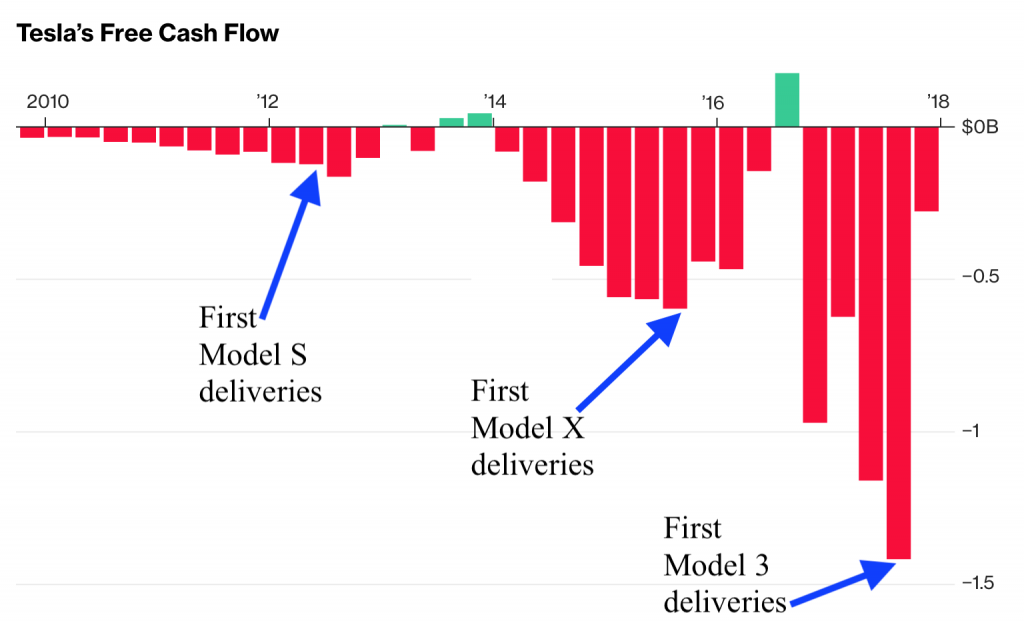It’s fine if you don’t like Elon Musk. But it’s a mistake to let antipathy for Musk’s ideas, businesses and public persona color your view of electric vehicles, and more specifically Tesla.
And that’s exactly what happens to token “conservative” New York Times opinion writer Bret Stephens. Stephens is otherwise known (at least to me) as a climate skeptic. But in a scathing and highly personal attack on Elon Musk, he betrays ignorance of another subject: electric vehicles.
After comparing Musk to Trump, he makes some misleading charges about Tesla:
Strong words — too strong, if you ask the satisfied customers of Tesla’s Model S (base price, $74,500) and X ($79,500). But Tesla is supposed to be the auto manufacturer of the future, not a bauble maker for the rich.
The company has rarely turned a profit in its nearly 15-year existence. Senior executives are fleeing like it’s an exploding Pinto, and the company is in an ugly fight with the National Transportation Safety Board. It burns through cash at a rate of $7,430 a minute, according to Bloomberg. It has failed to meet production targets for its $35,000 Model 3, for which more than 400,000 people have already put down $1,000 deposits, and on which the company’s fortunes largely rest.
Stephens makes Tesla sound like a money-losing luxury automaker. But Tesla could have easily turned a profit a long time ago, if it was in the short-term profit game. But it’s burning cash precisely because it’s scaling up a massive battery, solar panel and mass-market vehicle business. Check out this chart on Tesla cash flow from Ars Technica:
 It’s silly for Stephens to take a snapshot of Tesla’s current losses without broader context and insight into the company’s business plan. He whiffs on this score.
It’s silly for Stephens to take a snapshot of Tesla’s current losses without broader context and insight into the company’s business plan. He whiffs on this score.
But it gets worse. He then lobs a broad attack against EVs in general:
Tesla, by contrast, today is a terrible idea with a brilliant leader. The terrible idea is that electric cars are the wave of the future, at least for the mass market. Gasoline has advantages in energy density, cost, infrastructure and transportability that electricity doesn’t and won’t for decades. The brilliance is Musk’s Trump-like ability to get people to believe in him and his preposterous promises. Tesla without Musk would be Oz without the Wizard.
Much of the blame for the Tesla fiasco goes to government, which, in the name of green virtue, decided to subsidize the hobbies of millionaires to the tune of a $7,500 federal tax credit per car sold, along with additional state-based rebates. Would Tesla be a viable company without the subsidies? Doubtful. When Hong Kong got rid of subsidies last year, Tesla sales fell from 2,939 — to zero. It may be unfair to describe Tesla as Solyndra on wheels, but only slightly.
It’s time for fact checks. First, lithium ion batteries and electricity rival gasoline in all categories Stephens mentions. Electricity is ubiquitous (and locally produced). Batteries can recharge in minutes with technology now being introduced on the market, just like a gas station. And cheaper battery packs deliver the range today of a full tank of gas. And on all these fronts, the technology and infrastructure is set to improve in the next few years — not decades, as Stephens suggests.
But even more important, electricity as a fuel doesn’t poison our air and lungs like burning gasoline — or leave us dependent on foreign governments for a global commodity. Gasoline is not priced for those externalities. Since Stephens doesn’t accept climate science, he may not care. But the rest of us should.
And this notion that Tesla survives on government handouts is also misleading. Many Tesla customers are wealthy enough where the tax incentives and rebates don’t factor into their decision-making, according to data collected in California on rebate customers. If anything, Tesla is now hurt by government incentives for fossil fuels and rival automakers with new electric vehicles on the market.
In short, Stephens is ignorant on this topic and unfortunately has written a column that spreads misinformation on a critical climate-fighting technology.


